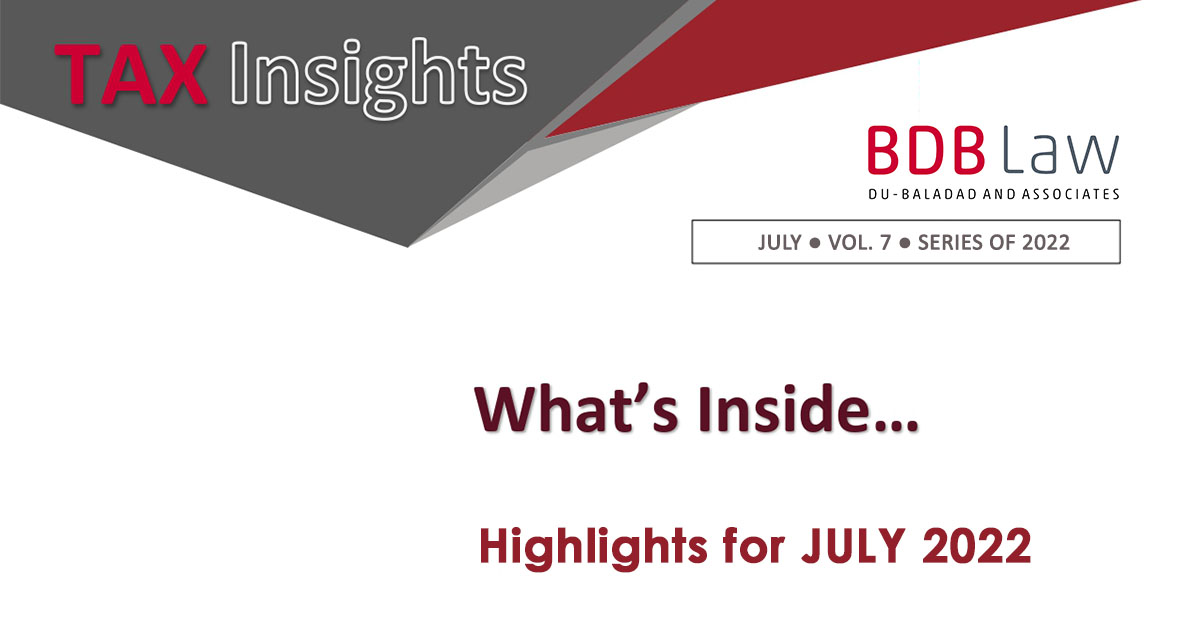


JULY • VOL. 7 • SERIES OF 2022
INSIGHTS is a monthly publication of BDB LAW to inform, update and provide perspectives to our clients and readers on significant tax-related court decisions and regulatory issuances (includes BIR, SEC, BSP, and various government agencies).
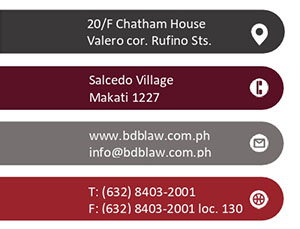
DISCLAIMER: The contents of this Insights are summaries of selected issuances from various government agencies, Court decisions, and articles written by our experts. They are intended for guidance only and as such should not be regarded as a substitute for professional advice.
Copyright © 2022 by Du-Baladad and Associates (BDB Law). All rights reserved. No part of this issue covered by this copyright may be produced and/or used in any form or by any means – graphic, electronic, and mechanical without the written permission of the publisher.
What's Inside ...
- HIGHLIGHTS FOR JULY 2022
- SIGNIFICANT COURT DECISIONS
- Supreme Court
- Court of Tax Appeals
- SIGNIFICANT REGULATORY ISSUANCES
- Bureau of Internal Revenue
- Securities and Exchange Commission
- Insurance Commission
- Department of Finance
- Bangko Sentral Ng Pilipinas
- Fiscal Incentives Review Board
- Bureau of Customs
- PUBLISHED ARTICLE
- MAPping Out Transfer Pricing Regulations
- OUR EXPERTS
- The Personalities
- The Personalities


HIGHLIGHTS for JULY 2022
SUPREME COURT DECISIONS
- Nowhere in Section 3.1.4 of RR No. 12-99, as amended by RR No. 18-13, does it provide that a fresh 180-day period is granted to the CIR to act on such administrative appeal. (Nueva Ecija II Electric Cooperative, Inc. Area II (NEECO II Area II) Vs. Commissioner of Internal Revenue, G.R. No. 258101 (Resolution), April 19, 2022)
- Under Sec. 4.112-2(a) of RR No. 16-2005, the government is mandated to withhold a final VAT at the rate of 5% on its gross payment, and that the remaining 7% standard input tax is allowable as input tax, in lieu of the actual input tax of the seller directly attributable to sales to the government. (Commissioner of Internal Revenue vs. Unisys Public Sector Services Corporation, G.R. No. 229078 (Resolution), June 15, 2022)
- The failure in proving an administrative claim for a CWT refund/credit dues does not preclude the filing of the judicial claim for the same. (Commissioner of Internal Revenue vs. Philippine Bank of Communications, G.R. No. 211348, February 23, 2022)
COURT OF TAX APPEALS DECISIONS
- An LOA is still valid even if the same was not revalidated after one hundred twenty (120) days from the issuance thereof pursuant to DOF DO No. 11-2009 and RMO No. 44-2010. (Commissioner of Internal Revenue vs. Tektite Insurance Brokers, Inc., CTA EB No. 2443, June 20, 2022)
- Under RA 9513, a Renewable Energy Developer's zero-rated purchases are those necessary for the development, construction and installation of plant facilities. (Philippine Geothermal Production Company, Inc., vs. Commissioner of Internal Revenue, CTA Case Nos. 9882, 8858 and 10010, June 3, 2022)
- There is a violation of the taxpayer’s rights to due process if the FLD/FAN merely reiterated the findings contained in the PAN without explanations and consideration of the taxpayer’s request for clarification indicated in the Reply to PAN. (Commissioner of Internal Revenue vs. Morning Star Milling Corporation, CTA EB No. 2419 (CTA Case No. 9294), June 21, 2022)
- If a judicial claim for refund of CWT was filed following the CIR’s inaction on the taxpayer’s administrative claim, the Court may give credence to all evidence presented by the taxpayer, including those that may not have been submitted in the first instance. (Commissioner of Internal Revenue vs. Procter & Gamble Philippines, Inc., CTA EB No. 2422 (CTA Case No. 9634) June 22, 2022)
- The reckoning period of the 180-day period for the CIR to act on the protest in the form of a request for reinvestigation should be counted from the extended period given by the CIR or his authorized representative. (Commissioner of Internal Revenue vs. Solutions Using Renewable Energy, Inc., CTA EB No. 2387 (CTA Case No. 8974), June 23, 2022)
- If a taxpayer denies ever receiving an assessment from the BIR, the burden of proof is shifted to the BIR to prove by competent evince that such notice was indeed received by the addressee. (Commissioner of Internal Revenue vs. Square One Realty Corporation, CTA EB No. 2396 (CTA Case No. 9484), June 23, 2022)
BIR ISSUANCES
- RR No. 5-2022 – Implements the Estate Tax Exemption under RA No. 11597 (An Act Providing for the Revised Charter of the Philippine Veterans Bank, Repealing for the Purpose Republic Act No. 3518, as Amended, Otherwise Known as ‘An Act Creating the Philippine Veterans Bank, and for Other Purposes)
- RR No. 6-2022 – Removal of Five (5)-year Validity Period on Receipts/Invoices
- RR No. 7-2022 – Tax Incentives under the Renewable Energy Act of 2008 and the Policies and Guidelines for the Availment Thereof
- RR No. 8-2022 – Prescribing Policies and Guidelines for the Implementation of Section 237 and 237-A of the NIRC, as amended by TRAIN Law, Through the Use of the Electronic Invoicing/Receipting System (EIS)
- RR No. 9-2022 – Prescribing Policies and Guidelines for the Admissibility of Sales Documents in Electronic Format in Relation to the Implementation of Section 237, Issuance of Receipts or Sales or Commercial Invoices, and 237-A, Electronic Sales Reporting System, of the NIRC, as amended by TRAIN Law
- RR No. 10-2022 – Prescribing the Guidelines and Procedures for Requesting Mutual Agreement Procedure ("MAP") Assistance in the Philippines
- RR No. 11-2022 – Prescribing the Guidelines and Procedures for the Spontaneous Exchange of Taxpayer Specific Rulings
- RMC No. 78-2022 dated June 8, 2022 – Clarifying the Income Tax Treatment of the Different Classifications of Educational Institutions and Their Tax Obligations
- RMC No. 82-2022 dated June 28, 2022 – Clarification on the Service of Letter of Authority Pursuant to Revenue Audit Memorandum Order (RAMO) No. 1-2000
- RMC No. 84-2022 dated June 30, 2022 – Prescribing the Template for Sworn Declaration to be Executed by the Registered Business Enterprise (RBE) in Relation to Q and A No. 36 of RMC No. 24-2022
- RDAO No. 4-2022 dated June 2, 2022 – Delegation Authority to Sign and Approve Certificate of Tax Exemption from Income Tax and from Withholding Tax (CTE) for Separation Benefits Received by Officials and Employees on Account of Their Separation from Employment Due to Death, Sickness or Other Disability
SEC ISSUANCES
- SEC- OGC Opinion No. 22-04 , dated March 29, 2022 – This provides that a corporation may assume a business or trade name other than its corporate name.
- SEC- OGC Opinion No. 22-05 , dated April 13, 2022 – This discusses how the nationality of the trustee will impact the nationality of the Proposed Corporation and the legality of the latter’s pursuit of its real estate business.
- SEC- OGC Opinion No. 22-06 , dated May 10, 2022 – This provides for the disposition of the remaining undistributed assets of a dissolved corporation even after the period of three (3) years.
- SEC- OGC Opinion No. 22-07 , dated May 26, 2022 – This provides the applicability of Section 22 vis-à-vis Section 46(f) of the Revised Corporation code (“RCC”) on the residency requirement of directors.
- SEC- OGC Opinion No. 22-08 , dated May 30, 2022 – This provides that a foreign corporation shall obtain an amended license if it decides to pursue additional purpose in the Philippines.
- SEC- Memorandum Circular No. 6, Series of 2022, dated June 9, 2022 – This provides the extension on the deadline of compliance requirement particularly on the Transition from Sole Practitioner to Partnership Structure and two (2) – Partner Requirement.
IC ISSUANCES
- IC Circular Letter CL-2022-28 dated June 16, 2022 – This provides the extension of period for the submission of the Annual Corporate Governance Report (ACGR).
- IC Circular Letter CL-2022-29 dated June 20, 2022 – This provides the rules and regulations concerning the Transitional Financial Reporting Framework (TFRF) for insurance and professional reinsurance companies.
- IC Circular Letter CL-2022-30 dated June 21, 2022 – This provides the regulatory relief on the admittance of premiums receivable due to the COVID-19 pandemic for the periods ending 31 December 2020 up to 30 June 2022.
- IC Circular Letter CL-2022-31 dated June 22, 2022 – This provides the guidelines on formal closure of liquidation proceedings for Insurance Companies under Liquidation.
DOF ISSUANCES
- DOF Opinion No. 010-2022 – An appeal filed out of time will be dismissed and DOF has no appellate jurisdiction to review CIR decisions on VAT refund claims.
- DOF Opinion No. 011-2022 dated June 29, 2022 – The giving of reasonable per diems is not automatically an "inurement" in violation of the prohibition provided for under Section 30(F) of the NIRC.
- DOF Opinion No. 012-2022 dated June 29, 2022 – Wristwatches and clocks are not considered non-essential goods under Section 150(a) of the Tax Code.
BSP ISSUANCES
- BSP Circular Letter No. CL-2022-049 dated June 20, 2022 - This CL directs the issuance of Sanctions Freeze Order (SFO) to take effect immediately against certain designated individuals, pursuant to their designation as terrorists by the Anti-Terrorism Council (ATC), in its Resolution Nos. 31 and 32, both dated 25 May 2022.
- BSP Circular Letter No. CL-2022-052 dated June 28, 2022 – Dissemination to all BSFIs the Anti-Money Laundering Council (AMLC) report entitled “An Analysis of the Usefulness of Foreign Currency Declarations in Detecting Possible Cross-Border Transportation of Illicit Funds”
- BSP Memorandum No. M-2022-029 dated June 6, 2022 - Guidelines on Handling of Consumer Concerns on PESONet and lnstaPay.
FIRB ISSUANCES
- FIRB Advisory 005-2022, June 6, 2022 - This provides for the adjustment in the submission of tentative reports to the Fiscal Incentives Review Board (FIRB) Secretariat, the BIR and the DOF.
BOC ISSUANCES
- CMO No. 15-2022, June 2, 2022 - This provides for the Rules and Regulations Implementing Customs Administrative Order (“CAO”) No. 12-2019 on the Transshipment of Goods.
- CMC No. 75-2022, June 3, 2022 - Informs all concerned of the levy of the temporary Most Favored Nation (“MFN”) tariff rates.
- AOCG Memo No. 199-2022, June 10, 2022 - This provides full Implementation of the CBW-Automated Inventory System (AIMS)..

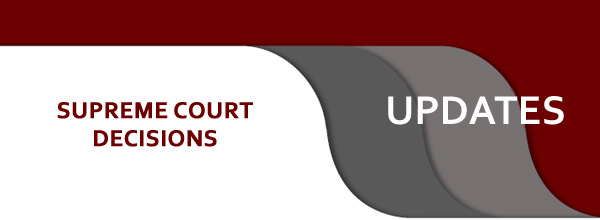
Nowhere in Section 3.1.4 of RR No. 12-99, as amended by RR No. 18-13, does it provide that a fresh 180-day period is granted to the CIR to act on such administrative appeal.
On July 22, 2016, the taxpayer filed its protest letter to the FLD and FAN. On September 19, 2016, the taxpayer submitted all the relevant documents to support its protest. On October 7, 2016, the taxpayer received the decision of the CIR’s representative denying its protest. On November 4, 2016, the taxpayer elevated the decision before the CIR.
The taxpayer mistakenly counted a new period of 180 days from November 4, 2016 for the CIR to decide on the appealed decision of his authorized representative and that it had thirty (30) days reckoned from November 4, 2016 or until June 3, 2017, within which to file a Petition for Review with the CTA. The taxpayer filed its Petition for Review on June 2, 2017.
Section 228 of the Tax Code unmistakably provides that the 180-day period should be reckoned from the “submission of documents”, which in this case was on 19 September 2016. Perforce, the statutory 180-day period lapsed on 18 March 2017. From such point, taxpayer had 30 days, or until 17 April 2017, to elevate the case to the CTA. However, it filed its Petition only on 2 June 2017, which is beyond the reglementary period provided by the law.
Notably, Section 3.1.4 of RR No. 12-99, as amended by RR No. 18-13, which implements Section 228 of the Tax Code, provides for alternative courses of action to the taxpayer upon its receipt of the FDDA issued by the authorized representative of the Commissioner on Internal Revenue (CIR), including the option of elevating the protest to the CIR himself through a request for reconsideration. However, nowhere in said provision does it provide that a fresh 180-day period is granted to the CIR to act on such administrative appeal. (Nueva Ecija II Electric Cooperative, Inc. Area II (NEECO II Area II) v. Commissioner of Internal Revenue, G.R. No. 258101 (Resolution), April 19, 2022)
Under Sec. 4.112-2(a) of RR No. 16-2005, the government is mandated to withhold a final VAT at the rate of 5% on its gross payment, and that the remaining 7% standard input tax is allowable as input tax, in lieu of the actual input tax of the seller directly attributable to sales to the government.
A taxpayer entered into a contract with the National Statistics Office (NSO) in relation to the latter's Civil Registry System Information Technology Project (CRS-ITP). In accordance with Section 114(C) of the Tax Code, 5% of the taxpayer's gross sales to NSO was withheld by the NSO as withholding agent. After filing several VAT returns, the taxpayer later discovered that it erroneously paid VAT to the BIR when it used its actual accumulated input VAT attributable to its sales to NSO, which is lower in amount, instead of the 7% standard input VAT leading to a higher net VAT payable. Thus, the taxpayer filed for a claim for refund for the alleged erroneously overpaid VAT.
For its part, the BIR insists that the standard input tax of 7% is only a standard, which is simply the limit by which actual input tax is compared to determine if it exceeds, or if it is below the standard of 7% of gross sales to the government.
The Supreme Court rule that the refund was proper. It reasoned that sales to the government or any of its political subdivisions, instrumentalities or agencies of goods and services are subject to 12% VAT. However, the language of Sec. 4.112-2(a) of RR No. 16-2005 clearly provides that the government is mandated to withhold a final VAT at the rate of 5% on its gross payment, and that the remaining 7% standard input tax is allowable as input tax, in lieu of the actual input tax of the seller directly attributable to sales to the government. The amount withheld by the government represents the net VAT payable by the seller, and the seller is not required to pay the difference between the 12% VAT and the 5% final VAT withheld by the government. Thus, the seller's actual input VAT which is attributable to its sales to the government remains unutilized. (Commissioner of Internal Revenue v. Unisys Public Sector Services Corporation, G.R. No. 229078 (Resolution), June 15, 2022)
The failure in proving an administrative claim for a CWT refund/credit dues does not preclude the filing of the judicial claim for the same.
The taxpayer filed a petition with the CTA praying for the issuance of a TCC for its excess/unutilized CWT for the year 2006. It alleged that the said petition was filed due to the inaction of the CIR on the former’s claim for a TCC. On the other hand, the BIR argued that the taxpayer’s claim for the issuance of a TCC is in a nature of a refund and thus subject to the administrative examination of the BIR. It further argued that the taxpayer failed to fully comply with the requirements for the administrative claim for CWT refund/credit, hence the judicial claim with the CTA was premature.
The Supreme Court affirmed the CTA En Banc’s ruling that the failure of the taxpayer to comply with the requirements of its administrative claim for refund/credit does not preclude its judicial claim. A judicial claim for tax credit/refund CWT is independent from its administrative counterpart as implied in Section 204(C) and 229 of the Tax Code which require that both administrative and judicial claims to be filed within the same two-year prescriptive period. With reference to Section 229 of the NIRC, the only requirement for a judicial claim of tax credit/refund to be maintained is that a claim of refund or credit has been filed before the CIR; there is no mention in the law that the claim before the CIR should be acted upon first before a judicial claim may be filed. (Commissioner of Internal Revenue v. Philippine Bank of Communications, G.R. No. 211348, February 23, 2022)

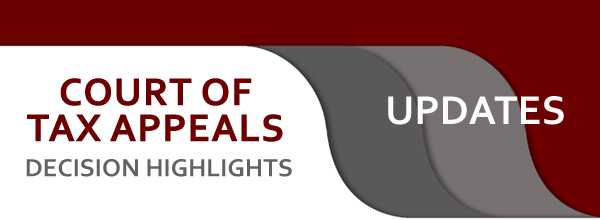
An LOA is still valid even if the same was not revalidated after one hundred twenty (120) days from the issuance thereof pursuant to DOF DO No. 11-2009 and RMO No. 44-2010.
The taxpayer argues that the PAN and FAN/FLD are void for having been issued pursuant to an unrevalidated LOA. However, the BIR contends that the LOA is valid as DOF DO No. 006-99 and RMO No. 43-90 were expressly repealed by DOF DO No. 011-09 and RMO No. 044-10, respectively.
The CTA En Banc found the BIR’s argument meritorious. It is clear that the need for revalidating an LOA after one hundred twenty (120) days from the issuance thereof has been expressly revoked by both DOF DO No. 11-2009 and RMO No. 44-2010. Considering the 120-day period has been revoked by the aforecited implementing rules, the LOA is valid.
In view of the foregoing, the Court finds that the failure of the revenue officer (RO) to have the LOA revalidated did not render the LOA invalid. In other words, the RO was still authorized to examine the taxpayer’s books of accounts and other accounting records for all internal revenue taxes despite the lapse of the 120-day audit period. (Commissioner of Internal Revenue vs. Tektite Insurance Brokers, Inc., CTA EB No. 2443, June 20, 2022)
Under RA 9513, a Renewable Energy Developer's zero-rated purchases are those necessary for the development, construction and installation of plant facilities.
The taxpayer argued that as a Renewable Energy (RE) Developer, its sales of fuel or power generated from renewable sources are VAT zero-rated. On the other hand, the BIR stood firm on his decisions partially denying the taxpayer’s applications for refund claiming that the taxpayer’s claims for refund should be strictly construed against it.
The CTA partially granted the Petition. As an RE Developer, the taxpayer is governed by the provisions of RA No. 9513 (Renewable Energy Act of 2008). Under RA 9513, an RE Developer's zero-rated purchases are those necessary for the development, construction and installation of plant facilities. Thus, the taxpayer is entitled to a zero-rated VAT on its local purchases.
Here, however, the sources of input are domestic purchases consisting of office supplies, utilities, and communication expenses for the operation of the plant facilities. Furthermore, the enjoyment of zero-rating on the taxpayer's purchases are, as stated, limited only to domestic purchases but not to international purchases. A perusal of the records would show that a chunk of petitioner's unutilized input VAT sought to be refunded pertains to input VAT paid by petitioner on its importations. (Philippine Geothermal Production Company, Inc., vs. Commissioner of Internal Revenue, CTA Case Nos. 9882, 8858 and 10010, June 3, 2022)
There is a violation of the taxpayer’s rights to due process if the FLD/FAN merely reiterated the findings contained in the PAN without explanations and consideration of the taxpayer’s request for clarification indicated in the Reply to PAN.
The taxpayer received the PAN and thereafter filed its Reply thereto. The FLD/FAN was later issued without changing the assessments stated in the PAN nor containing any explanation on how the BIR ruled on the taxpayer’s arguments in the Reply. The assessments were later upheld in the FDDA. The taxpayer assails the validity of the assessment for there was a violation of its right to due process. However, the BIR insists that it did not violate respondent's due process rights and claims that the taxpayer was given every opportunity to refute the assessment and, in fact, the taxpayer was able to protest intelligently and there was even a reduction in the amount of the assessment.
The CTA found that the assessments are void. It noted that the assessments contained in the FLD/FAN were exactly the same as those stated in the PAN. The only differences are that (1) assessment numbers were indicated; and (2) the amounts of interest were adjusted. Both in the FLD/FAN and FDDA, the BIR did not give any sufficient explanation or information as how the figures were arrived at and also did not give any reason for rejecting the taxpayer’s contention or request for clarification. Thus, the taxpayer was left unaware on how the BIR appreciated its explanations or defenses it raised against the PAN which is a clear violation of its right to administrative due process. (Commissioner of Internal Revenue vs. Morning Star Milling Corporation, CTA EB No. 2419 (CTA Case No. 9294), June 21, 2022)
If a judicial claim for refund of CWT was filed following the CIR’s inaction on the taxpayer’s administrative claim, the Court may give credence to all evidence presented by the taxpayer, including those that may not have been submitted in the first instance.
A claim for refund was filed by the taxpayer but the BIR failed to act on the same which prompted the taxpayer to file its Petition for Review before the CTA. The BIR argued that the CTA lacked jurisdiction over the Petition due to the taxpayer’s failure to comply with documentary requirements of RMO No. 53-98 and RR No. 2-2006 when It filed its administrative claim.
The CTA granted the taxpayer’s claim for refund. Citing Pilipinas Total Gas, Inc. vs. CIR (GR No. 207112, December 8, 2015), the SC made a distinction between administrative cases appealed due to the CIR’s inaction and those dismissed due to the failure of the taxpayer to submit supporting documents. The SC ruled that if an administrative claim was dismissed by the CIR due to the taxpayer’s failure to submit complete documents despite notice/request, the judicial claim before the CTA would be dismissible, not for lack of jurisdiction, but for the taxpayer’s failure to substantiate the claim at the administrative level. It is crucial for the taxpayer to prove that its administrative claim should have been granted in the first place. Consequently, a taxpayer cannot cure its failure to submit a document requested by the BIR at the administrative level by filing the said document before the CTA.
On the other hand, if the administrative appeal was never acted upon; there was no decision for the CTA to review on appeal per se. Thus, the CTA may give credence to all evidence presented by the taxpayer, including those that may not have been submitted in the first instance.
Here, the taxpayer filed the claim for a refund with the CTA in division following the CIR’s inaction. Thus, it may submit documentary evidence regardless of whether such documents were previously submitted to the CIR at the administrative level. (Commissioner of Internal Revenue vs. Procter & Gamble Philippines, Inc., CTA EB No. 2422 (CTA Case No. 9634) June 22, 2022)
The reckoning period of the 180-day period for the CIR to act on the protest in the form of a request for reinvestigation should be counted from the extended period given by the CIR or his authorized representative.
The BIR issued FLD/FAN against the taxpayer. The taxpayer filed its protest on February 11, 2014 and was able to timely filed the relevant supporting documents within the 60-day period or on April 11, 2014. On June 11, 2014 it received a letter from the RDO stating that the 60-day period had lapsed and giving the taxpayer additional 15 days to submit the relevant documents from receipt of the said letter. Thus, on June 25, 2014, the taxpayer re-submitted its supporting documents. In view of the CIR's inaction on its protest to the FLD/FAN, the taxpayer filed a Petition for Review before the CTA on January 21, 2015, or within thirty (30) days from the lapse of the 180-day period from June 25, 2014 or on December 22, 2014. However, the BIR contests that the Petition was filed out of time.
The Court en banc ruled that the petition was timely filed. In cases of a request for reinvestigation, the taxpayer is given 60 days from filing of a request for reinvestigation to submit the relevant supporting documents in support of the protest. Upon submission of the relevant documents, the period of action on part of the CIR or his duly authorized representative is 180 days. In case of inaction, the taxpayer may either: (1) appeal to the CTA within 30 days after the expiration of the 180-day period; or await the final decision of the CIR.
The reckoning of the 180-day period for the CIR to act on the protest should be on June 25, 2014, the extended period given by the RDO. Thus, the taxpayer had until January 21, 2015 to file its petition. In this case, the taxpayer filed the same on January 21, 2015. It cannot be ignored that it was because of the letter issued by RDO which prompted SURE to re-submit its relevant supporting documents despite the fact that it had already submitted the same earlier. The Court cannot turn blind to the glaring injustice, should it allow the CIR to benefit from the mischievous scheme. (Commissioner of Internal Revenue vs. Solutions Using Renewable Energy, Inc., CTA EB No. 2387 (CTA Case No. 8974), June 23, 2022)
If a taxpayer denies ever receiving an assessment from the BIR, the burden of proof is shifted to the BIR to prove by competent evince that such notice was indeed received by the addressee.
The taxpayer filed before the CTA a petition to cancel the assessments against it. The CIR alleged that the assessments have become final and executory due to the taxpayer’s failure to file a valid protest to the FAN/FLD. The taxpayer, on the other hand, argued that it did not receive the FAN/FLD.
The CTA en banc ruled that the assessments are invalid. The CTA reiterated the well-established rule that if a taxpayer denies ever receiving an assessment from the BIR, the burden of proof is shifted to the BIR and it is incumbent upon the latter to prove by competent evince that such notice was indeed received by the addressee. Here, the CIR failed to contravene the allegation of non-receipt of FLD/FAN. (Commissioner of Internal Revenue vs. Square One Realty Corporation, CTA EB No. 2396 (CTA Case No. 9484), June 23, 2022)

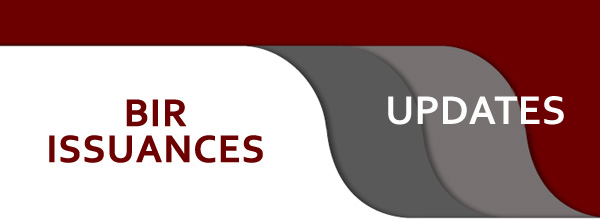
RR No. 5-2022 dated June 20, 2022
Implements the Estate Tax Exemption under RA No. 11597 (An Act Providing for the Revised Charter of the Philippine Veterans Bank, Repealing for the Purpose Republic Act No. 3518, as Amended, Otherwise Known as ‘An Act Creating the Philippine Veterans Bank, and for Other Purposes).
All transfers, by way of succession or donation mortis causa, made by a veteran of his/her shares of stock, common or preferred, with the Veterans Bank shall not be subject to estate tax, provided that the same was made in favor of the veteran’s widow, orphan or compulsory heir as determined by existing laws.
For purposes of availing the estate tax exemption, the term “veteran or veterans” shall include primarily any person or persons who served in the regularly constituted air, land, or naval services or arms, or in such non-regularly organized military units in the Philippines during World War II, and whose services with such units are duly recognized by the Republic of the Philippines or by the government of the United States of America, and those veterans referred to under Republic Act (RA) No. 6948, as amended by RA No. 7696 and RA No. 9396. The term also includes the widow, orphan or a compulsory heir of a deceased veteran, as determined by existing laws.
RR No. 6-2022 dated May 23, 2022
Removal of Five (5)-year Validity Period on Receipts/Invoices.
1. The five-year validity period of the Permit to Use (PTU) and/or system-generated receipts/invoices based on RMO No. 12-2013, RMC Nos. 10-2020 and 5-2021, RMO No. 9-2021, RR No. 11-2004, RMO No. 10-2005 is hereby removed, hence all PTUs to be issued shall be valid unless revoked by the Bureau of Internal Revenue (BIR) on grounds which shall include, but not limited to, the following:
A. Tampering of sales data/integrity of the data and/or software specification/features to alter/avoid the recording of a sale transaction;
B. Any major repair, upgrade, integration and modification/alteration without prior notification and approval by the BIR office concerned, including the items enumerated in Section V, Item No. 8 of RMO No. 9-2021, to wit:
i. Change in the functionalities of the system, particularly on enhancements that will have a direct effect on the financial aspect of the system that includes modified computations and other financial-related issues that were considered;
ii. Addition or Removal of modules or submodules within the system that will have a direct impact on the financial aspect of the system;
iii. Change in the system/software Version or Release Number that will have enhancements on the financial aspect of the system; and
iv. All other enhancements that will be deemed as a major system enhancement based on the recommendation of the technical evaluators of the BIR.
C. Any violation(s) on the policies and procedures for registration under RMO No. 10-2005 and RMO No. 9-2021, and other related revenue issuances.
2. The phrase "THIS INVOICE/RECEIPT SHALL BE VALID FOR FIVE (5) YEARS FROM THE DATE OF THE PERMIT TO USE" as previously required under RR No. 10-2015, as amended by RR No. 16-2018, and the phrase "Valid Until" required on RMC No. 107-2019 shall be OMITTED at the bottom portion of the system-generated receipts/invoices;
3. ATP principal and supplementary receipts/invoices inclusive of its serial numbers and its usage shall also have no expiration, thus, the phrase "THIS INVOICE/RECEIPT SHALL BE VALID FOR FIVE (5) YEARS FROM THE DATE OF THE ATP." and the phrase "Valid Until (mm/dd/yyyy)" on the manual receipts/invoices previously required on RMO No. 12-2013 shall also be OMITTED (or DISREGARDED for unused receipts/invoices).
RR No. 7-2022 dated June 22, 2022
Tax Incentives under the Renewable Energy Act of 2008 and the Policies and Guidelines for the Availment Thereof.
Renewable Energy (RE) developers and manufacturers, fabricators, and suppliers of locally-produced RE equipment shall secure the certifications/ accreditations specified in these Regulations before any incentive provided for in the Act may be availed of.
Existing and new RE developers and manufacturers, fabricators, and suppliers of locally-produced RE equipment shall register with the Department of Energy (DOE), through the Renewable Energy Management Bureau (REMB). The following certifications shall be secured and submitted to the BIR:
1. DOE Certificate of Registration - issued to an RE developer holding a valid RE Service/Operating Contract. For existing RE projects, the new RE Service/Operating Contract shall pre-terminate and replace the existing Service Contract that the RE Developer has previously executed with the DOE. The DOE Certificate of Registration is issued immediately upon award of an RE Service/Operating Contract covering an existing or new RE project or upon approval of additional investment. Any investment added to existing RE projects is subject to prior approval by the DOE.
2. DOE Certificate of Accreditation - issued to RE manufacturers, fabricators, and suppliers of locally-produced RE equipment, upon submission of necessary requirements as determined by the DOE, in coordination with the Department of Trade and Industry (DTI).
RE developers shall secure the Certificate of Endorsement from the DOE prior to the first year of availment of the 10% Corporate Income Tax rate incentive. Manufacturers, fabricators, and suppliers of locally-produced RE equipment who import components, parts, and materials necessary for the manufacture and/or fabrication of RE equipment shall secure a Certificate of Endorsement from the DOE, through the REMB, on a per importation basis.
To qualify for incentives under the Act, RE developers, manufacturers, fabricators, and suppliers of locally-produced equipment shall register with the Board of Investments (BOI). The Certificate of Income Tax Holiday (ITH) Entitlement (CE) issued by the BOI is a required attachment to the current annual Income Tax Return (ITR) to be filed with the BIR. The ITH shall only be applied to the registered activity indicated in the CE. Failure to attach the CE to the ITR may result to the forfeiture of the ITH incentive for the covered taxable year.
Compliance with the above certification, registration and endorsement entitles the qualified taxpayer to the following tax incentives, subject to its respective guidelines and conditions as provided in the Regulation:
A. Income Tax Holiday (ITH) – exemption from income tax for a specific period
B. Net Operating Loss Carry Over (NOLCO) – the NOLCO for the first 3 years may be carried over for the next 7 years
C. Corporate Tax Rate – 10% corporate tax after availing the ITH period
D. Accelerated Depreciation - Plant, machinery and equipment that are reasonably needed and actually used for the exploration, development and utilization of RE resources may be depreciated using a rate not exceeding twice the rate which would have been used had the annual allowance been computed.
E. Zero-Percent VAT – on sales and particular purchases are zero-rated
F. Tax Exemption of Carbon Credits - All proceeds from the sale of carbon emission credits shall be exempt from any and all taxes.
On the other hand, all manufacturers, fabricators, and suppliers of locally-produced RE equipment and components duly recognized and accredited by the DOE and upon registration with the BOI, shall be entitled to the following privileges on their sale of RE equipment to RE developers, subject to its respective guidelines and conditions as provided in the Regulation:
A. VAT-free importation of components, parts and materials
B. ITH and exemption from income taxes for 7 years on net income derived from the sale of RE equipment, machinery, parts, and services
C. Zero-percent VAT on their transactions with local suppliers of goods, properties, and services needed in the manufacture/fabrication of RE equipment
All individuals and entities engaged in the plantation of crops and trees used as Biomass Resources shall be exempt from payment of VAT on all types of agricultural inputs, equipment, and machinery within 10 years from the effectivity of the Act, subject to the certification by the DOE and the conditions set forth in the Regulations.
RR No. 8-2022 dated June 22, 2022
Prescribing Policies and Guidelines for the Implementation of Section 237 and 237-A of the NIRC, as amended by TRAIN Law, Through the Use of the Electronic Invoicing/Receipting System (EIS).
The following taxpayers are mandated to issue electronic receipts or sales/commercial invoices under Sec. 237 of the NIRC of 1997, as amended, to wit:
1. Taxpayers engaged in the export of goods and services;
2. Taxpayers engaged in electronic commerce (e-commerce); and
3. Taxpayers under the Large Taxpayers Service (LTS).
Relative thereto, Section 237-A of the NIRC of 1997, as amended, required the abovementioned taxpayers, except for the taxpayers engaged in e-commerce, to electronically report or transmit their sales data to the Bureau through the use of their Sales Data Transmission System.
On the other hand, taxpayers who are not covered by the mandate may issue electronic receipts or sales/commercial invoices in lieu of manual receipts/invoices.
The Bureau, as mandated, established an Electronic Invoicing/Receipting System (EIS) capable of storing and processing the data required to be transmitted by covered taxpayers using their Sales Data Transmission System.
In compliance with the relevant provisions of the TRAIN Law, these Regulations hereby direct the covered taxpayers to comply with the following:
1. Issuance of e-Receipts/e-Invoices to their customers/buyers, in lieu of manual receipts/invoices;
2. Registration of their Computerized Accounting System (CAS) generating e-receipts/e-invoices and/or Cash Register Machines (CRM)/Point-of-Sales Systems and Certification of Sales Data Transmission System; and
3. Transmission of the sales data covered by the e-receipts/e-invoices using their Sales Data Transmission System into the EIS of the Bureau.
All taxpayers mandated to adhere to these Regulations shall follow the policies and guidelines provided therein. A separate issuance shall be provided for the details and specific requirements thereof.
RR No. 9-2022 dated June 23, 2022
Prescribing Policies and Guidelines for the Admissibility of Sales Documents in Electronic Format in Relation to the Implementation of Section 237, Issuance of Receipts or Sales or Commercial Invoices, and 237-A, Electronic Sales Reporting System, of the NIRC, as amended by TRAIN Law.
In compliance with the TRAIN law, the Bureau has developed the Electronic Invoicing/Receipting and Sales Reporting System (EIS) that is capable of storing and processing sales data required to be transmitted by covered taxpayers using their Sales Data Transmission System. EIS is also capable of issuing sales documents through its web-based issuance facility to be used by qualified taxpayers that will be determined by the BIR. EIS ensures integrity and reliability of the sales and purchases data that will be generated and verified therefrom.
Thus, these Regulations are issued to address concerns of taxpayers in the substantiation of sales and purchases, particularly the submission of hard copies of invoices and receipts and to ease compliance with the BIR. On the part of the Bureau, this will provide a more efficient and accurate manner of investigating internal revenue tax liabilities of taxpayers and verification of sales and purchases in the processing of VAT refund claims under Section 112 of the National Internal Revenue Code of 1997 (Tax Code), as amended.
Pursuant to Sections 244 and 245 of the Tax Code, as amended, these Regulations are hereby promulgated to provide policies and guidelines for the admissibility of electronic sales documents or data, particularly in the verification of sales and purchases of taxpayers especially during audit or processing of VAT refund claims, in relation to Section 237 and 237-A of the National Internal Revenue Code (NIRC) of 1997, as amended by R.A. No. 10963 or the TRAIN Law, particularly with the following taxpayer groups:
1. Taxpayers engaged in the export of goods and services;
2. Taxpayers engaged in electronic commerce (e-commerce); and
3. Taxpayers under the Large Taxpayers Service (LTS).
These Regulations also cover taxpayers that are not included in the above group of taxpayers but have been authorized by the Bureau to issue electronic SIs/ORs through the web-based facility of the EIS.
All taxpayers covered by these Regulations shall follow the policies and guidelines provided therein. A separate issuance shall be provided for the details and specific requirements thereof.
RR No. 10-2022 dated June 29, 2022
Prescribing the Guidelines and Procedures for Requesting Mutual Agreement Procedure ("MAP") Assistance in the Philippines.
The Regulations prescribe the guidelines and procedures to be followed by taxpayers in requesting for Mutual Agreement Procedure (MAP) assistance from the Philippine Competent Authority to resolve disputes arising from taxation not in accordance with the provisions of the relevant Double Taxation Agreement (DTA).
The Regulations enumerate some typical examples of taxation that are not in accordance with a tax convention that would necessitate a MAP assistance.
To implement the MAP article, the Commissioner of Internal Revenue (CIR) is designated as the Competent Authority for the Philippines (Philippine CA). Where it is not possible for the CIR to deal directly with MAP cases, he/she shall delegate his/her functions and powers to other competent officials of the BIR via a Revenue Delegated Authority Order (RDAO).
The Rulings and MAP Section of the International Tax Affairs Division (ITAD) (hereinafter referred to as the "MAP Office") shall commence the analysis and resolution of MAP cases. The recommendation of the MAP Office shall be reviewed by the Chief of ITAD. The proposed resolution or action of the ITAD on the MAP cases shall be subject to review by the Assistant Commissioner for Legal Service, the Deputy Commissioner for Legal Group and finally, by the Competent Authority or his/her authorized representative. In the interest of time, the Competent Authority may introduce streamlining procedures, taking into account the inventory of MAP cases and the number of handling officers.
A taxpayer may, prior to making a formal request for MAP assistance, request for a pre-filing consultation following the procedures outlined in these Regulations. To request for MAP assistance, a taxpayer must submit a request in writing, which must be signed by the taxpayer or its/his/her authorized representative. The request should contain and include the information and documentation as specified in Subsection 3 of the Regulations and should be submitted to the ITAD office as specified in the Regulations.
RR No. 11-2022 dated June 29, 2022
Prescribing the Guidelines and Procedures for the Spontaneous Exchange of Taxpayer Specific Rulings.
The Regulations prescribes the guidelines and procedures for the spontaneous exchange of taxpayer specific rulings.
The International Tax Affairs Division (lTAD) of the Bureau of Internal Revenue (BIR), through its Exchange of Information (EOI) Section, shall be responsible for exchanging the taxpayer specific rulings to the foreign tax authority of the potential exchange jurisdictions on or before the prescribed deadline. The rulings within the scope of the transparency framework include the following:
i. rulings related to a preferential regime;
ii. cross-border unilateral Advance Pricing Arrangements (APAs) and other cross-border unilateral tax ruling (such as an Advance Tax Ruling) covering transfer
pricing or the application of transfer pricing principles
iii. cross-border rulings giving a unilateral downward adjustment to the taxpayer’s taxable profits in the country giving the ruling
iv. PE rulings; and
v. related parts conduit rulings
The Philippines shall use the template designed by the Forum on Harmful Tax Practices (FHTP) and the Inclusive Framework on Base Erosion and Profit Shifting (BEPS) (Annex A of the Regulations). Revisions of the template shall always be adopted by the Philippines so long as it is practical and not burdensome on the part of the tax administration.
RMC No. 78-2022 dated June 8, 2022
Clarifying the Income Tax Treatment of the Different Classifications of Educational Institutions and Their Tax Obligations.
The Circular is issued to clarify the different classifications of educational institutions referred to in the National Internal Revenue Code of 1997, as amended ("Tax Code"), the income tax treatment under each classification, the tax exemption and tax liabilities of specified class of educational institutions, the required withholding taxes on certain income payments, and their compliance requirements.
The Circular covers the following educational institutions, as defined therein:
1. Proprietary Educational Institution (domestic and other corporations, and individuals)
2. Government Educational Institutions (with or without express provision in charter or law)
3. Non-stock and Non-profit Educational Institution (NSNP)
The Circular provides for the rules on:
A. Entitlement to deduction from gross income of donor’s contributions and gifts to domestic corporations organized and operated exclusively for education purposes and to exemption from donor’s tax for certain gifts and donations in favor of an NSNP educational institution; and,
B. Educational institutions’ withholding tax obligations as income payor and its withholding taxes on income received
As set forth in the Circular, all educational institutions are required to comply with registration requirements with the BIR, issuance of receipts and invoices, filing of tax returns, and for NSNP educational institutions, securing a one-time certificate of income tax exemption or exemption ruling from the BIR.
RMC No. 82-2022 dated June 28, 2022
Clarification on the Service of Letter of Authority Pursuant to Revenue Audit Memorandum Order (RAMO) No. 1-2000.
RAMO No. 1-2000 was already amended by RAMO No. 1-2020, thereby deleting the provision in Item No. Vlll 2.3 of RAMO No. 1-2000 which provides a timeline of 30 days to serve an electronic Letter of Authority (eLA) from its date of issue, otherwise the it becomes null and void unless revalidated.
While the timeline for the "service of eLA" is not explicitly provided in RAMO No. 1-2020, it is still for the best interest of the government that the eLA should be served to the taxpayer immediately upon issuance/assignment thereof. Hence, it should be necessary for all concerned Revenue Officers (ROs) as a duty or responsibility to serve the eLA immediately, considering that the entire audit process must be completed within a period of 180 days for RDO cases/240 days for LT cases from the date of issuance of eLA. Non-observance on the aforesaid timeline is gross neglect of duty, which is a grave offense subject to appropriate administrative sanctions pursuant to Revenue Memorandum Order No. 53-2010.
Further, the deletion of the 30-day period to serve the eLA shall in no case be an excuse for the concerned RO to delay its service nor for a taxpayer to refuse its service or to question its validity, in case the same is served beyond the 30-day period. Again, what is crucial is that the entire audit process shall be completed within a period of 180 days for RDO cases/240 days for LT cases from the date of issuance of eLA.
Therefore, eLA which remains unserved upon the effectivity of this Circular or have been served beyond the 30-day period from the date of its issuance shall still be considered valid and enforceable, provided that the 180-day/240-day period to complete the audit process has not yet expired.
RMC No. 84-2022 dated June 30, 2022
Prescribing the Template for Sworn Declaration to be Executed by the Registered Business Enterprise (RBE) in Relation to Q and A No. 36 of RMC No. 24-2022.
This Circular is being issued to prescribe the template of Sworn Declaration to be executed by the duly registered RBE stating that the goods and/or services being purchased shall be used directly and exclusively in the registered project or activity. The said sworn declaration shall then be provided to the RBE's supplier prior to the sale transaction to avail of the VAT zero-rate incentives.
RDAO No. 4-2022 dated June 2, 2022
Delegation Authority to Sign and Approve Certificate of Tax Exemption from Income Tax and from Withholding Tax (CTE) for Separation Benefits Received by Officials and Employees on Account of Their Separation from Employment Due to Death, Sickness or Other Disability.
In order to expedite the processing of applications for tax exemption of separation benefits received by officials and employees on account of their separation from employment due to death, sickness or other disability processed at the Large Taxpayers Service (LTS), pursuant to Revenue Memorandum Order (RMO) No. 26-2011 as amended by RMO No. 66-2016, the approval and signing of the Certificate of Tax Exemption from Income Tax and from Withholding Tax (CTE) is hereby delegated to the Assistant Commissioner (ACIR) of the LTS, or in his/her absence, the concerned Head Revenue Executive Assistant (HREA), as an addendum to RDAO No. 4-2007 as amended by RDAO No. 7-2007 and RDAO No. 4-2018.

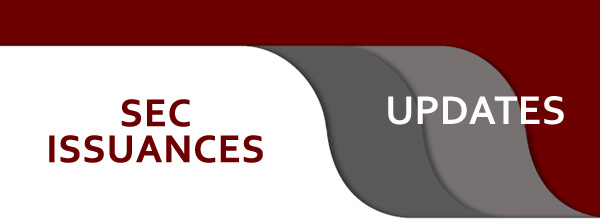
SEC - OGC Opinion No. 22-04,
Dated March 29, 2022
This provides that a corporation may assume a business or trade name other than its corporate name.
A corporation may assume a name other than its legal (corporate) name and carry on business in such assumed (business or trade) name. Business or trade name which is different from the corporate or partnership name shall be indicated in the articles of incorporation or partnership. A company may have more than one business or trade name.
It is settled that a corporation using an assumed name in executing a contract is bound just as much as if it had used its corporate name.
Likewise, the corporate name and the trade name of the corporation may be used interchangeably in the conduct of business. However, there are instances wherein the corporation is mandated to use, issue and /or submit papers reflecting therein not just its business name but also its corporate name.
SEC - OGC Opinion No. 22-05,
Dated April 13, 2022
This discusses how the nationality of the trustee will impact the nationality of the Proposed Corporation and the legality of the latter’s pursuit of its real estate business.
Shares may be issued in trust for another person. The shares may be registered in the name of one person but the beneficial owner may belong to another.
In order for a trustee of a trust fund for retirement benefits of employees to be considered a Philippine national, two requirements must be satisfied, namely: 1.) the trustee is a Philippine national and 2.) at least sixty percent (60%) of the fund will accrue to the benefit of the Philippine nationals. Moreover, control should be determined by looking at the stockholder’s ability to vote in the election of directors and other important corporate affairs.
In this particular case, the 50% shareholding of a minor, acquired by virtue of a Deed of Donation, will be held in trust by her Chinese father, with the authority to represent the minor in all stockholders’ meeting of the corporation, while she is still a minor. Since foreign control over the Proposed Corporation will exceed 40%, it will not comply with the Constitution and with the 40% foreign ownership threshold. Thus, the Proposed Corporation cannot engage in real estate business under this structure, being a nationalized activity.
Furthermore, Revised Corporation Code (RCC) requires stock ownership in order to be eligible as director. For the purpose of stock ownership qualification, the general rule is that beneficial ownership is not necessary and that a person who holds the legal title to stock on the books of the corporation is qualified, although the beneficial ownership may be in another. In this case, since the Chinese father represents the minor in such corporation, the legal title to the stocks issued shall be in the name of the Chinese father. As such, the trustee Chinese father may qualify as director subject to the allowable proportion under the Anti-Dummy Law.
SEC - OGC Opinion No. 22-06,
Dated May 10, 2022
This provides for the disposition of the remaining undistributed assets of a dissolved corporation even after the period of three (3) years.
Under the Revised Corporation Code (RCC), every corporation whose charter expires pursuant to its articles of incorporation, is annulled by forfeiture, or whose corporate existence is terminated in any other manner, shall nevertheless remain as a body corporate for three (3) years after the effective date of dissolution, for the purpose of persecuting and defending suits by or against it and enabling it to settle and close its affairs, dispose of and convey its property, and distribute its assets, but not for the purpose of continuing the business for which it was established.
While the RCC gives a dissolved corporation three (3) years to continue as a body corporate for purposes of liquidation, the disposition of the remaining undistributed assets must necessarily continue even after such period. Hence, the dissolved Company may still liquidate and dispose its lone asset despite the lapse of more than three (3) years since the revocation of its corporate charter.
Furthermore, if the three-year extended life has expired without a trustee or receiver having been expressly designated by the corporation within that period, the board of directors (or trustees) itself may be permitted to so continue as “trustees” by legal implication to complete the corporate liquidation.
SEC - OGC Opinion No. 22-07,
Dated May 26, 2022
This provides the applicability of Section 22 vis-à-vis Section 46(f) of the Revised Corporation code (“RCC”) on the residency requirement of directors.
Section 23 of the Old Corporation Code provides that a “majority of the directors or trustees of all corporations must be residents of the Philippines. On the other hand, Section 22 of the RCC provides for the qualifications and term of the board of directors or trustees of a corporation which does not anymore include the residency requirement.
However, Section 46(f) of the RCC allows private corporations to provide in their bylaws the directors’ qualifications such as residency requirement. Thus, if a corporation provides in its bylaws the requirement that majority of its directors must be residents of the Philippines, then, it may do so. Such corporation may not elect directors, all of whom are non-residents of the Philippines, if its bylaws still requires that the majority of the elected directors must be residents of the Philippines. The remedy is to amend their bylaws to formalize such choice pursuant to Section 46(f) of the RCC, the provisions of Section 22 notwithstanding.
SEC - OGC Opinion No. 22-08,
Dated May 30, 2022
This provides that a foreign corporation shall obtain an amended license if it decides to pursue additional purpose in the Philippines.
Under the Revised Corporation Code, every foreign corporation which is authorized to do business in the Philippines under a license issued to it shall continue to have such authority under the terms and conditions of its license, subject to the provisions of this Code and other special laws. The license to transact business in the Philippines issued by the Commission to a foreign corporation subsists as long as it retains its authority to act as a corporation under the laws of the country or state of its incorporation, unless such license is sooner surrendered, revoked, suspended or annulled.
Moreover, a foreign corporation authorized to transact business in the Philippines shall obtain an amended license in the event it changes its corporate name, or desires to pursue other or additional purposes in the Philippines, by submitting an application with the Commission, favorably endorsed by the appropriate government agency in the proper cases.
SEC Memorandum Circular No. 6,
Series of 2022, Dated June 9, 2022
This provides the extension on the deadline of compliance requirement particularly on the Transition from Sole Practitioner to Partnership Structure and two (2) – Partner Requirement.
The Revised SRC Rule 68 provides that auditing firms which have less than two (2) partners as of the date of the effectivity of the Revised SRC Rule 68, shall be given until 30 June 2022 within which to comply with the new two (2) partner requirement. While sole practitioners as of the date of the effectivity of the Rule shall be given until 30 June 2022, within which to comply with the requirements to convert to a Partnership structure from Sole Proprietorship in order to continue being accredited by the Commission.
After due consideration of requests from concerned firms and sole practitioners, the foregoing deadline was extended for four (4) more years or until 30 June 2026 without further extension to comply with requirements under the Revised SRC Rule 68 on the Transition from Sole Practitioner to Partnership and Two (2) Partner Requirement.
With said extension, the Office of the General Accountant will continue to accept applications for accreditations of sole practitioners and auditing firms with only (1) partner only until 31 March 2026 to give way for transition to comply with the above-requirements of the Revised SRC Rule 68 with the commitment from applicants that they will comply with said requirements by 30 June 2026.

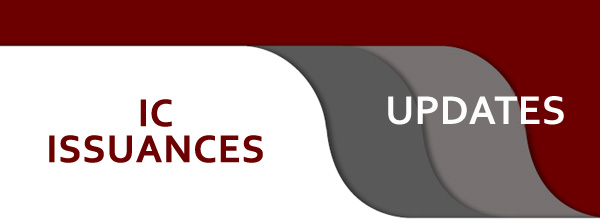
IC Circular Letter
CL-2022-28 dated June 16, 2022
This provides the extension of period for the submission of the Annual Corporate Governance Report (ACGR).
All Insurance Commission Regulated Companies shall submit their Annual Corporate Governance Report (ACGR) covering operations for the year 2021 on or before the extended deadline of 15 July 2022 without incurring any penalties for late compliance.
Late submission of the ACGR by the ICREs shall be meted by the Commission with monetary penalties ranging from Php 0- 100,000 for Basic Penalty and from Php 0- 10,000 for Monthly Penalty.
IC Circular Letter
CL-2022-29 dated June 20, 2022
This provides the rules and regulations concerning the Transitional Financial Reporting Framework (TFRF) for insurance and professional reinsurance companies.
The following rules and regulations concerning the FRF of insurance and professional reinsurance companies are hereby promulgated:
1. Transitional FRF (TFRF)
The TFRF shall use the Standard Chart of Accounts (SCA) for insurance and professional reinsurance companies for prudential reporting. This FRF aims to establish a uniform, minimum chart of accounts to improve financial data collection, reporting, accuracy and comparability in light of the new accounting standards.
2. Application of the TFRF
The TFRF shall be used during the transition period. Parallel run reporting using both the existing FRF and the TFRF shall be conducted starting 01 January 2025 relative to the implementation of the IFRS 17 pursuant to CL No. 2020-62 dated 18 May 2020. This is to allow the insurance industry to assess the collective impact of implementing the TFRF and likewise, provide this Commission an opportunity to engage the industry in a meaningful dialogue and obtain feedback on the financial results that can be reconciled and explained to various stakeholders prior to the full implementation. Further, unless otherwise specified by the provisions of the Amended lnsurance Code, and/or any lC-issued circulars, rules and regulations, the recognition and measurement of the accounts in the SCA shall be in accordance with the Philippine Financial Reporting Standards.
IC Circular Letter
CL-2022-30 dated June 21, 2022
This provides the regulatory relief on the admittance of premiums receivable due to the COVID-19 pandemic for the periods ending 31 December 2020 up to 30 June 2022.
The Circular promulgates the following rules on the relaxation on the admittance of premiums receivable due to COVID-19 pandemic for periods ending 31 December 2020 up to 30 June 2022:
a. The basis for admitting the Premiums Receivable account (direct agents, general agents and insurance brokers) for all non-life insurance and professional reinsurance companies shall be adjusted from 90 days to 180 days from the day of the inception of the policies.
b. Undue installment premiums shall be considered admitted assets as long as the date of inception of the policy is within 180 days from the cut-off date. However, in case of default in any installment due, all remaining unpaid installments shall be treated as non-admitted assets.
c. ln case of any deficiency in the Net Worth, collections during the first quarter of the following year of the over 180-day Premiums Receivable shall be considered as after-date transactions.
This rule shall be applied only to:
a. Quarterly reports and annual statements covering the periods 2020 and 2021;
b. 1st and 2nd quarter reports for the year 2022, provided, that the non-life insurance company shall submit a proof allowing the credit term beyond ninety (90) days to its policyholders, and a separate premiums receivable aging schedule with supporting documents.
IC Circular Letter
CL-2021-31 dated June 22, 2022
This provides the guidelines on formal closure of liquidation proceedings for Insurance Companies under Liquidation.
The Insurance Commission issues guidelines on formal closure of liquidation proceedings for insurance companies under liquidation and final disposal and distribution of assets including unclaimed benefits. This Guidelines shall cover all insurance companies currently or prospectively under liquidation. Companies currently in the process of formal closure may opt to continue with the steps being undertaken or be covered by this Guidelines. The guidelines also provide conditions that should be met for the application of final formal closure as well as the modes. Step by step closure process and the procedures for declaration of abandoned benefits were also laid down. The IC will also charge fees such as application for final formal closure, for approval of distribution plan and issuance of statement of final closure.

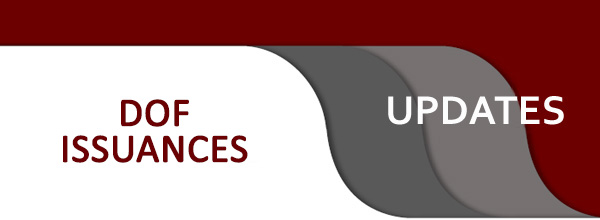
DOF Opinion No. 010-2022
An appeal filed out of time will be dismissed and DOF has no appellate jurisdiction to review CIR decisions on VAT refund claims.
Marubeni Corporation – Manila branch (MCMB) filed with the BIR Large Taxpayers District Office (LTDO) – Makati City an application for tax refund of the VAT erroneously withheld by the Light Rail Transit Authority (LRTA) for the fiscal years 2007 and 2007.
The LTDO granted partial refund for the fiscal year 2007 with payment made on 17 January 2018, while the Regional Director granted a partial refund for the fiscal year 2006 and was paid on 5 November 2019. MCMB filed its Motion for Reconsideration with the BIR asserting its right for full refund but was denied for lack of jurisdiction. MCMB thus filed a letter to DOF on 30 May 2022.
Section 3 of DOF Department Order No. 007-002 provides that a taxpayer who receives an adverse ruling from the Commissioner of Internal Revenue (CIR) may, within 30 days from date of receipt of such ruling, seek its review by the Secretary of Finance.
Apart from the procedural obstacle of being filed out of time, DOF has no appellate jurisdiction to review the same. MCMB received the CIR decisions and corresponding payments for its partial refund for the fiscal years 2007 and 2006 in 2018 and 2019, respectively. Since MCMB filed its request for review of the BIR decisions with the DOF only on 31 May, 2022, the same is filed beyond the thirty (30) days reglementary period.
DOF Opinion No. 011-2022 dated June 29, 2022
The giving of reasonable per diems is not automatically an "inurement" in violation of the prohibition provided for under Section 30(F) of the NIRC.
Cement Manufacturers' Association of the Philippines (CEMAP), Inc. ("CeMAP" or the "Association") applied for a Certificate of Tax Exemption under Section 30(F) of the National Internal Revenue Code ("NIRC") before the BIR but was denied on the ground that the provision in CeMAP's Amended AOI that its Trustees may be given reasonable per diems is in violation of the “inurement” prohibition under Section 30 (F) of the NIRC.
Section 30(F) of the NIRC provides that a business league, chamber of commerce, or board of trade shall, in order to enjoy income tax exemption, have no part of its net income inure to the benefit of any private individual.
The "inurement" prohibition under Section 30 of the NIRC, as amended, was specifically incorporated as a tool to ascertain that non-stock non-profit organizations are not used as a tax shelter through tax exemptions granted thereto or for their officers or organizers to gain or benefit from the income or assets of such organization, which should appropriately be devoted to the furtherance of the purpose/s for which it was organized.
CeMAP represented that it has not given out any kind of per diems to its Trustees. Nevertheless, the giving of reasonable per diems is not automatically an "inurement" in violation of the prohibition provided for by law. The DOF opines that the exigencies of the operations of non-profit organizations also require them to incur reasonable expenses. However, such per diem to be granted must be a legitimate expense arising from the performance of duties that will lead to the Association achieving its purposes.
As such, the DOF reverses the BIR’s denial of CEMAP’s application for Certificate of Tax Exemption.
DOF Opinion No. 012-2022 dated June 29, 2022
Wristwatches and clocks are not considered non-essential goods under Section 150(a) of the Tax Code.
A perusal of how the Tax Code defined non-essential goods was by providing an enumeration of goods deemed falling within its category or classification. For instance, in Section 194 of PD 1358 dated April 21, 1978, when the classification non-essential goods was first introduced, the said provision enumerated jewelry, automobiles, toilet preparations and others, as those subject to percentage tax. It appears that wristwatches and clocks were not at all considered in the Sections for Jewelry, Automobile, Perfumes and Others. In fact, when the imposition of percentage taxes on Section 197 (wristwatches and clocks) was discontinued in PD 1994, the subsequent law amending Section 194 (into Section 163) which was EO No. 36, also did not include wristwatches and clocks in the expanded coverage of non-essential goods subject to percentage tax. Thus, it is clear that when Section 163 (renumbered as Section 150) of EO No. 273 was carried forward as Section 150 of the 1997 Tax Code for the purposes of imposing excise tax at 20%, the enumeration therein did not contemplate the inclusion of wristwatches and clocks.
Moreover, the mere fact that the tax on semi-essential goods such as watches was repealed does not automatically mean that those goods classified therein would change characterization from semi-essential to non-essential. This Department believes that it is the function of the object that principally determines whether it is non-essential or semi-essential. Further, it should be noted that the price or value of the items do not necessarily dictate whether certain goods are non-essential or semi-essential. In fact, Section 150 (a) specifically subjects to excise tax even imitation jewelry precisely because they are non-essential. The same is true for opera glasses and lorgnettes. A watch is a semi-essential device which allows the wearer to keep track of time. Jewelry, on the other hand, is solely for personal adornment and, thus, is classified as non-essential.
In view of the foregoing, the Department reverses the Commissioner's ruling subjecting wristwatches made of precious metals to excise tax at 20% under Section 150(a) of the Tax Code.

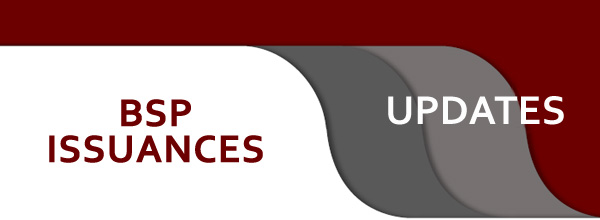
BSP Circular Letter No. CL-2022-049 dated June 20, 2022
This CL directs the issuance of Sanctions Freeze Order (SFO) to take effect immediately against certain designated individuals, pursuant to their designation as terrorists by the Anti-Terrorism Council (ATC), in its Resolution Nos. 31 and 32, both dated 25 May 2022.
This is to disseminate the AMLC Resolution Nos. TF-551 and TF-562, Series of 2022 (copies attached), directing the issuance of Sanctions Freeze Order (SFO) to take effect immediately against certain designated individuals, pursuant to their designation as terrorists by the Anti-Terrorism Council (ATC), in its Resolution Nos. 31 and 32, both dated 25 May 2022, and freezing without delay the following property or funds, including related accounts: (a) property or funds that are owned or controlled by the subject of designation, and is not limited to those that are directly related or can be tied to a particular terrorist act, plot, or threat; (b) property or funds that are wholly or jointly owned or controlled, directly or indirectly, by the subject of designation; and (c) property or funds derived or generated from funds or other assets owned or controlled, directly or indirectly, by the subject of designation; and (d) property or funds of persons and entities acting on behalf or at the direction of the subject of designation.
BSP-Supervised Financial Institutions (BSFIs) are reminded to submit to the AMLC: (a) a written return, pursuant to, and containing the details required under, Rule 16.c of the Implementing Rules and Regulations of Republic Act (R.A.) No. 10168, otherwise known as The Terrorism Financing and Prevention Act of 2012 (TFPSA); and (b) Suspicious Transaction Report on all previous transactions of the subjects of designation within five (5) days from effectivity of the SFO.
Any person, whether natural or juridical, including covered persons, among others, who (a) deals directly or indirectly, in any way and by any means, with any property or fund that they know or have reasonable ground to believe is owned or controlled by designated individuals, including funds derived or generated from property or funds owned or controlled, directly or indirectly, by such designated individuals; or (b) makes available any property or funds, or financial services or other related services to said designated individuals, shall be prosecuted to the fullest extent of the law pursuant to R.A. No. 10168 or TFPSA.
BSP Circular Letter No. CL-2022-052
dated June 28, 2022
Dissemination to all BSFIs the Anti-Money Laundering Council (AMLC) report entitled “An Analysis of the Usefulness of Foreign Currency Declarations in Detecting Possible Cross-Border Transportation of Illicit Funds”.
This is to disseminate to all BSFIs the AMLC’s report entitled “An Analysis of the Usefulness of Foreign Currency Declarations in Detecting Possible Cross-Border Transportation of Illicit Funds”1 dated April 2022.
This document presents the results of the first and second components of the AMLC’s three-part study on foreign currency (FX) declarations it received from the Bureau of Customs (BOC) for the period Q1 2015 to Q3 2021. A historical assessment of the trends and patterns (e.g., sources, destination, frequency, amounts declared, nationalities), among others, is at the core of this phase.
The study also presents specific cases involving Filipinos and foreign nationals with suspicious financial transactions and those with alleged participation in bulk-cash smuggling.
BSFIs are required to consider the results of the study in their risk analysis and assessment to inform money laundering, terrorist financing, and proliferation financing risk mitigation strategies.
BSP Memorandum No. M-2022-029 dated June 6, 2022
Guidelines on Handling of Consumer Concerns on PESONet and lnstaPay.
BSFIs participating in PESONet and lnstaPay, automated clearing houses (ACHs), are required to strictly adhere to the principles under BSP Circular No. 1048, series of 2019, on the BSP's Financial Consumer Protection Framework, and are required to:
1. Establish effective mechanisms to ensure that all frontline personnel at the BSFI's offices (e.g., head office, branches, branch-lite units), including those that handle customer issues lodged thru various available channels, possess adequate, accurate and relevant information about PESONet and lnstaPay to address consumer concerns and fund transfer issues, and to properly advise on redress mechanism and turn-around time for resolution of issues;
2. Post materials containing pertinent information on redress mechanism of PESONet and lnstaPay, including up-to-date contact information for consumer concerns specifically related to PESONeI and InstaPay, on appropriate channels such as the BSFI's website and official social media pages; and
3. Provide customer accessibility to a wide range of accessible contact channels for communication of consumer concerns, including but not limited to customer service hotlines, email, chatbot, and make available timely and adequate response to concerns sent via said channels.
The Philippine Payments Management, Inc. (PPMI), being the accredited payment System Management Body for retail payments as set out in BSP Circular Letter No. CL-2O2O-036, shall monitor and lead its members towards continued compliance with the NRpS framework, as well as ensure members' adherence to the applicable guidelines under the BSP's Financial Consumer Protection Framework (Circular No. lO4g).
Thus, the BSFIs are required to submit status of their compliance with this Memorandum to the PPMI. Said consolidated regular updates on the status of compliance of BSFIs with this Memorandum shall be reported by the PPMI to the BSP Payment System Oversight Department (PSOD) on a semestral basis.

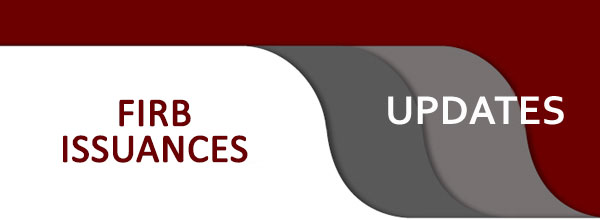
FIRB Advisory 005-2022 dated June 6, 2022
This provides for the Adjustment in the Submission of Tentative Reports to the Fiscal Incentives Review Board (FIRB) Secretariat, the BIR and the DOF.
Submission of the Investment Promotion Agencies (“IPAs”) and Other Government Agencies Administering Tax Incentives (“OGAs”) Consolidated Annual Tax Incentives and Annual Benefits Report to the BIR and the FIRB Secretariat:
a. Tentative submissions to be accepted on or before 14 June 2022; and
b. Amended and final submissions to be accepted on or before 15 July 2022, without the imposition of any penalty.
Submission of BIR and BOC of tax incentives reports to the DOF:
a. Tentative submissions to be accepted on or before 15 August 2022; and
b. Amended and final submissions to be accepted on or before 1 September 2022.

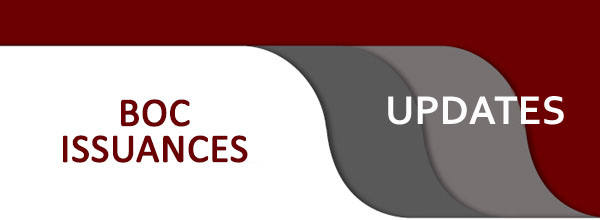
CMO No. 15-2022 dated June 2, 2022
This provides for the Rules and Regulations Implementing Customs Administrative Order (“CAO”) No. 12-2019 on the Transshipment of Goods.
This Order shall apply to all goods clearly indicated in the Transshipment Foreign Cargo Manifest as destined for a foreign destination other than the Port of Discharge, with the following salient administrative provisions:
• Treatment of Transshipment Goods – goods intended for transshipment shall not be subject to the payment of duties and taxes, provided, that the Transshipment Goods Declaration particularly indicates such nature of goods, duly supported by commercial or transport documents or evidence as required by the BOC.
• Accreditation of Transhippers – upon implementation of the electronic lodgment of Goods Declaration for Transshipment in the BOC’s computer system, all entities, natural or juridical, engaged in transshipment activities must apply for accreditation with the BOC as transshippers.
• Transshipment Goods Declaration – Request for issuance of Transshipment Permit, including the documentary requirements, shall be made at the Office of the Deputy Collector for Operations or equivalent office of the port where the goods for trasshipment will be discharged. Until such time the BOC’s computer system allows electronic lodgment of the transshipment goods declaration, the Transshipment Permit (TP) (BOC Form No. 199) shall continue to be in use.
• Examination at Port of Importation – goods for transshipment shall remain unopened in the original packing containers under the original shipper’s seal and shall not be inspected or examined at the port or airport of discharge.
• Period to Load – goods intended for Transshipment must be loaded in the exporting means of transport within thirty (30) calendar days from the date of arrival. For this purpose, the exportation commences when the carrying vessel or aircraft leaves the Philippine territory.
• Failure to Load – in case of failure to load within the period allowed, the transshipment Goods shall be treated by the BOC as regular importation.
CMC No. 75-2022 dated June 3, 2022
Informs all concerned of the levy of the temporary Most Favored Nation (“MFN”) tariff rates.
Executive Order (“EO”) No. 171 (series of 2022) on “Temporarily Modifying the Rates of Import Duty on Various Products Under Section 1611 of Republic Act No. 10863, Otherwise Known as the ‘Customs Modernization and Tariff Act’” took effect on June 15, 2022 and effective until December 31, 2022.
In view of the effectivity of EO No. 171, this Circular informs all concerned that all articles specifically listed in Annex A of EO 171 (series of 2022), which are entered into or withdrawn from warehouses in the Philippines for consumption, shall be levied the temporary MFN rates of duty as prescribed therein and requires the BOC to reflect the temporary MFN rates in the Electronic to Mobile (E2M) System
AOCG Memo No. 199-2022 dated June 10, 2022
This provides full Implementation of the CBW-Automated Inventory System (AIMS).
All Collection Districts and offices concerned are directed to ensure that all Customs Bonded Warehouses (CBW) and accredited members of Customs Common Bonded Warehouses (CCBWs) have registered in the Automated Inventory System (AIMS) and submitted all the necessary data as provided for in Section 4.2.3 and Section 4.3 of CMO No. 20-2021. After July 18, 2022, a Show Cause Order shall be issued by the Office of the Deputy Commissioner of AOCG to the concerned CBW for non-registration and non-filing of live AIMS declarations.
For the correct usage of the E2M Model of Declaration, the Chief of Warehousing Assessment Division must ensure that the customs examiners and appraisers will process only the Warehousing Goods Declaration lodged in the E2M System if the said declarations adhere to the following E2M Model of Declaration in order to be accepted in AIMS. This is to avoid cancellation of WSAD tag “PAID” in the E2M System.
For the case of export goods made from bonded raw materials or with mix local raw materials, the CBW shall be required to use EX2-1 as Model of Declaration in their ED-SAD lodged in the E2M System. Manual ED processed due to unavoidable circumstances must have a corresponding ED-SAD in the E2M System after the export goods is exported or as soon as the E2M System or VASP System is available already. The Export Division is mandated to check the accuracy of the Model of Declaration of the ED-SAD lodged by the CBW in the E2M System. EX1 is used for export goods made from local raw materials from the Philippines and EX3 is used by accredited importer/exporter of zone enterprise. If a CBW is accredited CBW by BOC and accredited exported by BOI at the same time, the CBW must use EX2-1 if the exported good is made from bonded raw materials or with mix local materials. This is to avoid cancellation of tag “ASSESSED/PAID” ED-SAD in the E2M System since AIMS accepts only two (2) valid model of declaration.

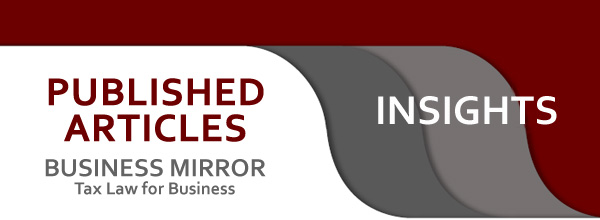
MAPping out Philippine Transfer Pricing Regulations
By Atty. Jomel N. Manaig
From 2020 to 2021, the BIR came into the transfer pricing scene swinging with a slew of issuances to beef up its abilities to address erosion of tax base. Though the news about transfer pricing had mellowed out since the initial requirement of filing the BIR Form 1709 and preparation of the Transfer Pricing Documentation, the BIR recently issued Revenue Regulations (“RR”) No. 10-2022 to remind taxpayers that transfer pricing is not a foregone matter.
RR No. 10-2022 was issued to focus on a very specific transfer pricing matter: Mutual Agreement Procedures (“MAP”). MAP is a process in the Double Tax Agreements (“DTA”) between the Philippines and foreign jurisdictions that allows the “competent authorities” (normally the tax authorities) from the contracting states to interact with the intent to resolve international tax disputes normally arising from double taxation. Although the procedure is mainly for the competent authorities of the taxing jurisdictions, taxpayers are not entirely left out since the latter are the ones affected by double taxation. Instead of appealing, either through administrative or judicial means, assessments arising from double taxation, MAP gives taxpayers another avenue to resolve the dispute.
This is a welcome respite for taxpayers that are subjected to taxation not in accordance with a tax convention. Through the process set out in the RR, taxpayers can request MAP assistance from the Philippine competent authority, the Commissioner of Internal Revenue (“CIR”), to resolve disputes arising from taxation not in accordance with the provisions of the relevant DTA.
Before making a formal MAP request, the concerned taxpayer is required to request for a “Pre-filing Consultation” with the International Tax Affairs Division (“ITAD”). If the Chief of the ITAD believes that issues may be resolved through MAP, the taxpayer shall be requested to submit a formal request for MAP assistance which shall contain the required minimum information and required supporting documentation.
The request must be submitted within the time limit specified in the DTA which may be within two (2) or three (3) years from the first notification of the action resulting in taxation not in accordance with the DTA. In cases where the DTAs do not provide a time limit, the MAP request must be submitted within three (3) years from the first notification. The filing period shall be reckoned from receipt of the Final Assessment Notice, or ruling denying the claim for treaty benefits, or any equivalent document containing the action which results to double taxation.
It should also be noted that the MAP assistance does not come for free. Fees associated with the resulting negotiation shall be shouldered by the taxpayer initiating the MAP request.
Once the request for MAP assistance is filed, the BIR shall analyze the request and determine if the action that resulted in the taxation not in accordance with the DTA is due to a measure taken in the Philippines. If so, the BIR may decide to resolve the request unilaterally. If a unilateral solution is not possible, the case will move to a bilateral stage where both competent authorities shall endeavor to resolve the case by mutual agreement. It should be noted that the competent authorities are not obliged to enter into an agreement for each individual MAP case.
In case a bilateral approach is warranted, actual discussions shall be between the competent authorities of the contracting states only. The involvement of the taxpayer shall be limited to presenting facts, its views, and other relevant information.
MAP cases shall be resolved within twenty four (24) months from receipt of the complete MAP request. Any agreement reached, or the failure to reach an agreement, shall be communicated to the taxpayer within thirty (30) days after the consultation or meeting. Another thirty (30) days will be given to the taxpayer to convey his acceptance or disapproval.
A request for MAP assistance is not an exclusive remedy and may be availed of even if there is a pending judicial or administrative appeal. It must be emphasized, however, that a MAP case cannot proceed simultaneously with the other remedies and the remedies availed of may be held in abeyance depending on the circumstances. With respect to decisions of local courts, a MAP case will not operate to overrule the former. Only issues not decided with finality by local courts will be discussed in MAP proceedings. Decisions of foreign courts, on the other hand, will not bind the BIR and the latter may choose to unilaterally provide relief to the taxpayer.
With the effectivity of RR No. 10-2022, taxpayers now have another remedy in its pocket. It may be worth it to explore this remedy to the fullest and go gain all benefits that come along with it. In the age of increased globalization and cross-border transactions, any and all remedies to avoid or alleviate double taxation is a welcome development. The effectivity and efficiency of implementation, though, is still up in the air. Hopefully, the competent authorities could make seeking MAP assistance worthwhile for taxpayers.
----------------------------------------------
For inquiries on the article, you may call or email
ATTY. JOMEL N. MANAIG
Junior Partner
T: +63 2 8403 2001 loc. 380
jomel.manaig@bdblaw.com.ph


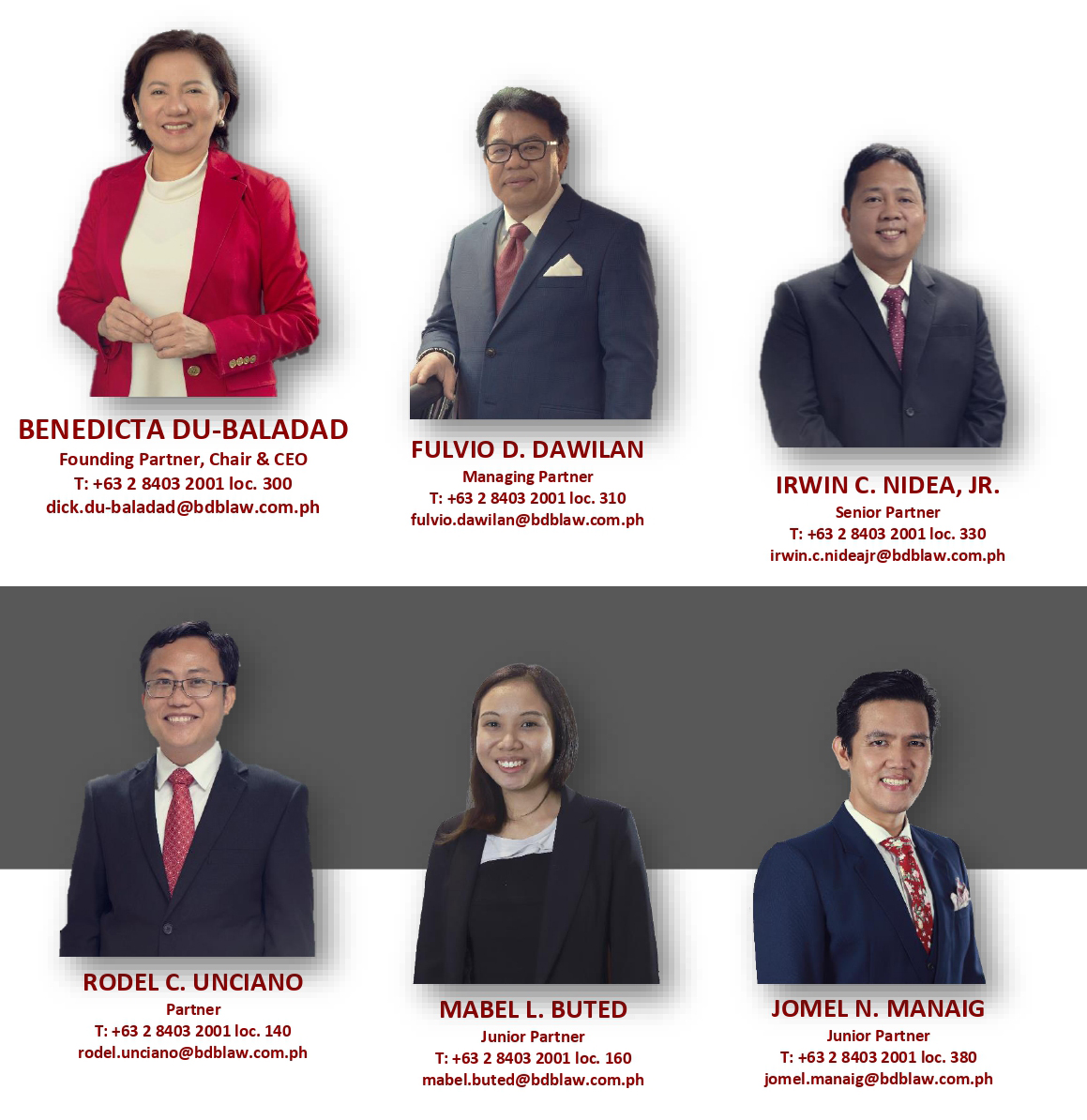
DISCLAIMER: The contents of this Insights are summaries of selected issuances from various government agencies, Court decisions and articles written by our experts. They are intended for guidance only and as such should not be regarded as a substitute for professional advice.
Copyright © 2022 by Du-Baladad and Associates (BDB Law). All rights reserved. No part of this issue covered by this copyright may be produced and/or used in any form or by any means – graphic, electronic and mechanical without the written permission of the publisher.





